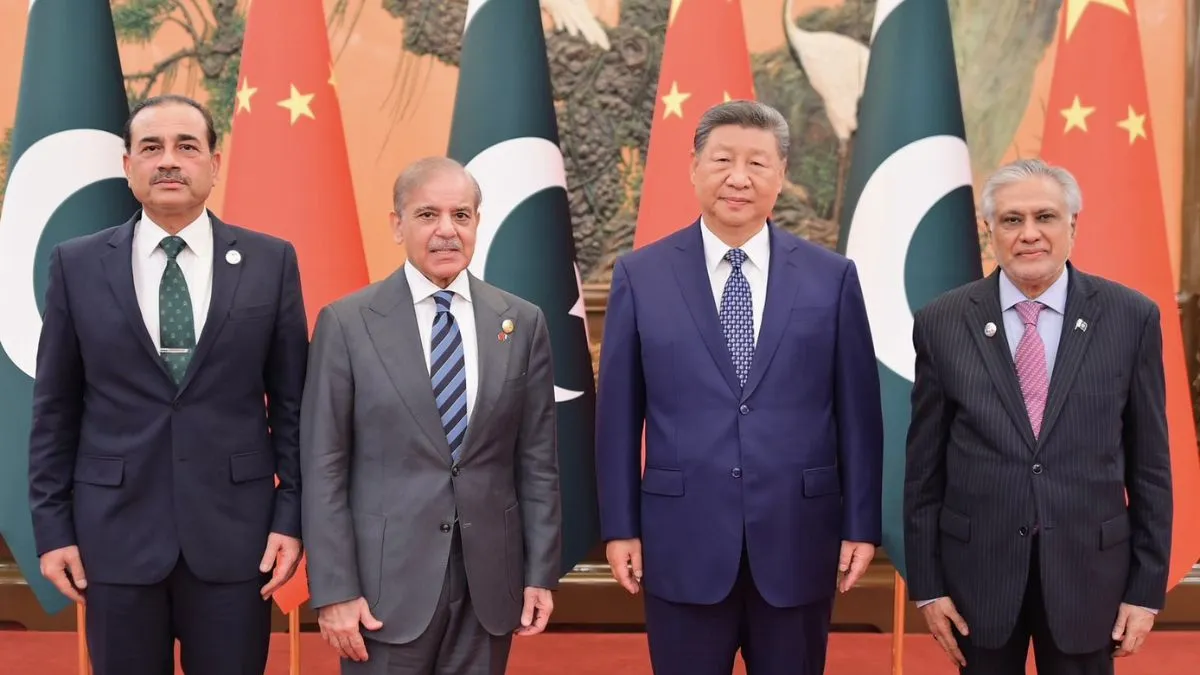- By Supratik Das
- Tue, 02 Sep 2025 06:12 PM (IST)
- Source:JND
Shehbaz Sharif Asim Munir meets Xi Jinping: After two days of speculation and murmurs of a diplomatic cold shoulder, Pakistan’s Army Chief Field Marshal Asim Munir finally appeared alongside Prime Minister Shehbaz Sharif for a high-profile meeting with Chinese President Xi Jinping in Beijing on Tuesday. The interaction, held after the Shanghai Cooperation Organisation (SCO) summit in Tianjin, marked Munir’s first direct engagement with Xi since assuming the top military post, ending a conspicuous absence that had triggered chatter in diplomatic circles.
For the first two days of the SCO summit, Xi Jinping had met several world leaders, including Prime Minister Narendra Modi and Russian President Vladimir Putin, but both Munir and Sharif were missing from his schedule, fueling speculation of a snub. Adding to Pakistan’s awkward diplomatic optics, a video clip from Monday’s SCO plenary session went viral, showing Shehbaz Sharif rolling his eyes as Prime Minister Modi and President Putin walked past him, chatting and laughing. In another clip from the “family photo” session, Sharif was seen breaking formation to rush and offer a handshake to Putin, who momentarily turned back before continuing his walk with Xi. The videos fueled a wave of online commentary mocking Sharif’s “attention-seeking” behavior. This is not the first time Sharif has been caught in an awkward spotlight at an SCO summit. In 2022, a viral clip showed him fumbling with a translation headset during talks with Putin, prompting laughter from the Russian leader.
Security Concerns Dominate Talks
The eventual meeting on Tuesday came as part of Shehbaz Sharif’s bilateral engagement at the Great Hall in Beijing, with Munir and Deputy Prime Minister Ishaq Dar forming part of the delegation. Deputy PM Dar later posted on X (formerly Twitter), “PM Shehbaz Sharif met President Xi Jinping at the Great Hall, where delegations from both sides held wide-ranging talks on bilateral & regional cooperation. Under President Xi’s visionary leadership, our all-weather strategic partnership continues to grow stronger, fostering peace, connectivity & shared prosperity.” This was the first time Field Marshal Munir, who assumed charge last year, met Xi Jinping face-to-face. His previous visit to China in July had only included talks with Vice President Han Zheng, a departure from the practice followed with his predecessor, General Qamar Javed Bajwa, who met Xi directly during his Beijing trips.
PM Shehbaz Sharif @CMShehbaz met President Xi Jinping at the Great Hall, where delegations from both sides held wide-ranging talks on bilateral & regional cooperation.
— Ishaq Dar (@MIshaqDar50) September 2, 2025
Under President Xi’s visionary leadership, our all-weather strategic partnership continues to grow stronger,… pic.twitter.com/i2JliuZamn
According to China’s state-run Xinhua news agency, Xi Jinping pressed Pakistan to take “effective measures” to safeguard Chinese nationals and projects in the country, particularly those linked to the Belt and Road Initiative (BRI) and the flagship China-Pakistan Economic Corridor (CPEC). Xi underlined that while China values the “iron brotherhood” with Pakistan, repeated militant attacks on Chinese engineers and workers in recent years have strained cooperation. “China supports Pakistan’s fight against terrorism and hopes Pakistan will create a secure environment for bilateral cooperation,” Xi was quoted as saying. Sharif, in response, promised “no effort will be spared” in ensuring the safety of Chinese personnel and infrastructure. He also hailed Xi’s Global Governance Initiative (GGI), calling it “a significant step for peace, stability and development.”
ALSO READ: Pakistan PM Shehbaz Sharif Shows Water Pain At SCO, As PM Modi Talks Tough On Terror
During Tuesday’s talks, Xi Jinping urged Pakistan to expedite the next phase of the CPEC and the Free Trade Agreement, positioning the projects as central to regional connectivity. However, the Chinese side again stressed security guarantees as a prerequisite for investment flow, given recent militant strikes on Chinese engineers in Balochistan and Khyber Pakhtunkhwa. Beijing has also been pressing Islamabad to allow Chinese private security firms to operate inside Pakistan, though Islamabad has so far resisted such a move.
With China balancing ties with India and Russia while keeping Pakistan close, the SCO summit once again demonstrated the delicate equilibrium Beijing maintains in its regional diplomacy.
With inputs from agencies.

